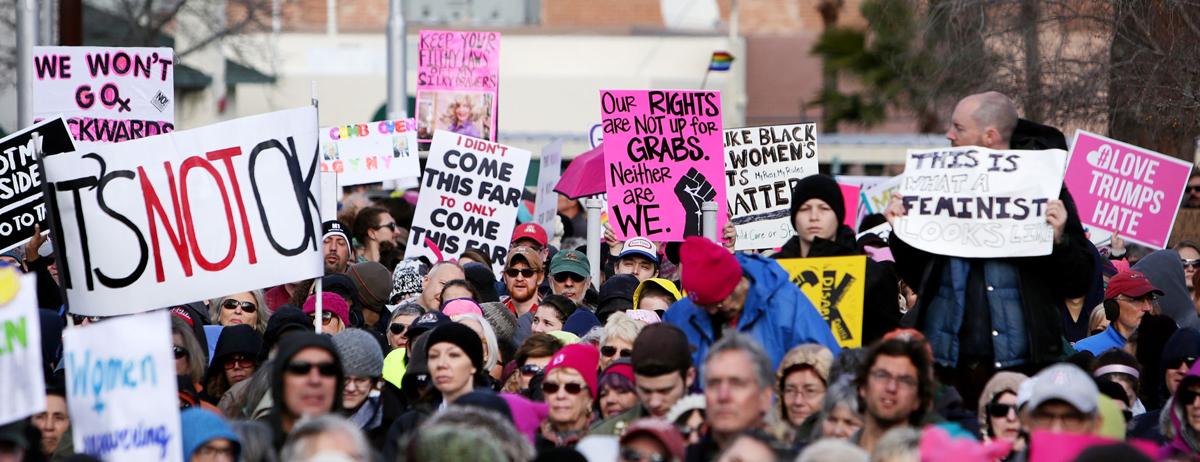Two years ago, Gabriella Cázares-Kelly hoped maybe 30 or 40 indigenous people would show up to walk in the Tucson Women's March.
About 200 came, representing 17 tribes, says Cázares-Kelly, a member of the Tohono O'odham Nation.
This year, they'll lead the Tucson march.
Cázares-Kelly says women from more than 20 toka teams have been invited to take the first steps of the march, Sunday, Jan. 20.
Toka is a traditional game — similar to field hockey — that's played by Tohono O'odham women using equipment made from desert materials. The players who come for the march have also been invited to bring their u'usaga, sticks made of mesquite. Other indigenous people will join them.
"We're still here..." Cázares-Kelly says. "And we have very real issues in our communities that need to be addressed."
She says those include the number of missing and murdered indigenous women who go unreported, along with issues that affect all women.
In 2017, women (along with men and children) rallied in cities around the country following the inauguration of President Trump. The Tucson version of the march drew an estimated 15,000 people downtown.
There was no Tucson march last year. Instead, several volunteers from the 2017 event organized a vigil, encouraging people to channel frustration and grief over the political climate into kindness toward their neighbors.
But Cynthia Bistrain, this year's march chair, missed what she experienced in 2017. So the Tucson Women's March is back, with the YWCA of Southern Arizona as a fiscal sponsor. It’s being put together by a number of first-time organizers.
The local march is not part of the national organization that puts on the protest in Washington, D.C. That distinction is important for local volunteers.
Almost since its beginning, the national organization that grew out of that first march, Women's March, Inc., has struggled internally — for exclusion of anti-abortion groups, for a focus on white women and now for accusations of anti-Semitism.
The anti-Semitism accusations came after Women's March, Inc. co-president Tamika Mallory received praise from Nation of Islam leader Louis Farrakhan, who is known for anti-Semitic rhetoric, The Associated Press reported.
Mallory later denounced those statements, but that hasn't stopped other cities from cancelling their own marches.
In response, the Tucson Women's March denounced all forms of anti-Semitism and asserted its independence from the national organization, noting that Tucson's march happens Jan. 20, the day after the Washington march.
"We strive to be an all-inclusive group that welcomes all people, ethnicities, cultures and religions," a statement on the local group's website says. "We stand firmly in opposition to any behavior that threatens the well-being of any community and believe we are stronger together. Together we rise."
Tucson Women's March media chair Hallie Lyons emphasized the local focus here that overrode any considerations of cancelling.
"For the most part, we know that the Tucson community wants this..." she says. "We want to inspire the next women leaders to run for office and tackle causes and lead the march next year."
The speaker lineup this year includes a diverse group of women speaking on topics including women's empowerment, LGBTQ issues, missing and murdered indigenous women, immigration and gun violence, among others. Speeches will be translated into Spanish and American Sign Language.
Cázares-Kelly says she does know of some women of color choosing not to march because of under-representation, but for her, these conversations have to start somewhere.
"This is really about activating our community and encouraging civic engagement within our community and resistance" says Cázares-Kelly, a co-founder of Indivisble Tohono, a group that engages with legislation affecting the Tohono O'odham Nation. "We do recognize the complications. It's a hard space to be in."
The event downtown will begin at 10 a.m. with speeches. The roughly one-mile route will circle Jácome Plaza. There will be a space designated for those who just want to watch and several wheelchairs available, Lyons says.
"We are trying our hardest to stay super inclusive, and our ears and hearts are open to suggestions," Lyons says. "Anything we can do to make people more comfortable, we would be happy to hear."
If you go
What: Tucson Women's March
When: Sunday, Jan. 20, 10 a.m. to 2 p.m.
Where: Jácome Plaza, at the corner of Stone Avenue and Pennington Street in downtown Tucson
More info: Visit tucsonwomensmarch.com
Other events
Sign-making party: The YWCA of Southern Arizona, 525 N. Bonita Ave. is hosting a sign-making to prepare for the march 8 a.m. to noon, Saturday, Jan. 12.
Silent auction: Bid on donated art and gift certificates at La Cocina, 201 N. Court Ave., 5-8 p.m. Monday, Jan. 14.
"Ask for Jane" movie night: The Tucson Women's March is co-sponsoring with Tucson International Jewish Film Festival and Planned Parenthood the showing of a film about a network developed to provide safe abortions prior to Roe v. Wade. The film is at 7:30 p.m. Saturday, Jan. 19 at the Tucson Jewish Community Center, 3800 E. River Road. A discussion with a film actress and co-producer will follow. Tickets cost $10. Get them here.
For more information about all of these events, visit tucsonwomensmarch.com.





